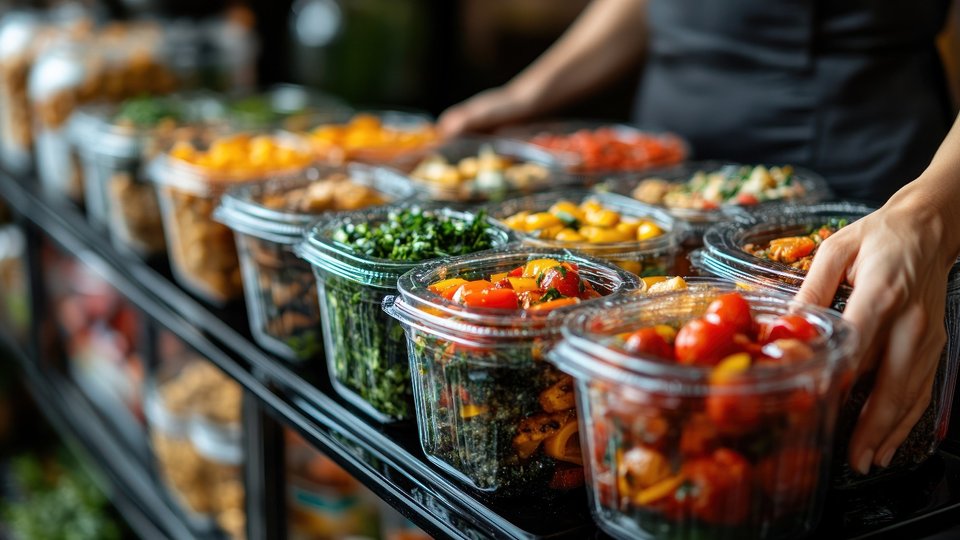Catering
9 catering trends revealed

March 3, 2025 by Terry Matthews — Managing Partner, Off Premises Growth Academy
Sometimes, when I'm walking my dog, working out, or even dreaming, I start thinking about catering. I think about catering a lot. Like Sisyphus pushing that rock up a hill, I'm always wondering how to push restaurant catering just that little bit further.
Recently, my team and I started the CaterLinked.com community to do exactly that—to think and learn about catering in a deeper fashion. To that end, I made a post asking the community for some recent trends in catering. Thanks to Szabi Bako, Mary Shillue-Goldberg and Nick Panos for the wonderful suggestions! Here's some of what came up.
1. Sustainability is no longer optional
Sustainability in catering is no longer a "nice to have"—it's a requirement. More than ever, businesses expect catering providers to have clear sustainability commitments. This means sourcing local ingredients, using eco-friendly packaging, and adhering to broader Environmental, Social, and Governance (ESG) standards. Many corporations now require vendors to sign a code of conduct detailing their ESG obligations before even considering them as partners. Restaurants that want to stay competitive in the catering space must be proactive, not just in marketing their sustainability efforts, but in implementing them at every level of operation.
2. Functional & wellness catering on the rise
Food at work is no longer just about feeding employees — it's about fueling them. More companies now view catering as an investment in productivity, seeking meals that contribute to employee well-being. This means the rise of superfoods, functional beverages, and meals designed to enhance focus and energy levels. Adaptogenic drinks, nutrient-rich bowls, and thoughtfully curated snacks are becoming more popular. Operators who recognize this shift can differentiate themselves by offering catering menus tailored to health-conscious workplaces.
3. The hybrid catering model is here to stay
Flexibility is key in modern catering. While traditional full-service catering still has its place, clients now expect a mix of drop-off catering (efficient, cost-effective, and scalable) and experience-driven setups (themed stations, branded activations, and live food preparation). Corporate clients, in particular, want the ability to switch between these models depending on the occasion. Caterers who can provide both streamlined, no-fuss options and high-end experiential services will have a competitive advantage in today's market.
4. Data-driven personalization
Leading operators are now using data to drive decision-making at every level—from menu planning and operational efficiency to customer experience. Reliable data platforms help caterers track customer preferences, optimize ingredient sourcing, and even predict future trends. The ability to collect and analyze data allows for more precise menu customization and better forecasting, helping operators avoid waste while enhancing customer satisfaction. Having an internal system or a trusted software platform to analyze catering data is becoming a necessity rather than a luxury.
5. The tech-forward ordering shift
The shift toward digital ordering has only accelerated, with more decision-makers preferring to place catering orders online rather than through traditional methods like phone calls or emails. A growing number of clients now expect a seamless, self-service ordering experience, mirroring their expectations in other areas of business. This means that restaurants need robust, user-friendly online ordering systems that integrate with their operations. If a restaurant still relies solely on manual ordering, it risks being overlooked in favor of competitors with more convenient, tech-driven solutions.
6. Dietary restrictions & allergen awareness
Dietary restrictions and allergen concerns have always been a priority in catering, but the stakes are higher than ever. As food at work shifts from being a perk to an expectation, ensuring inclusivity in catering menus has become a critical concern. If an employer provides food that excludes certain employees due to dietary restrictions, what should be a benefit could quickly become a liability. More organizations are prioritizing allergen transparency and menu customization, meaning caterers must be ready to accommodate a variety of dietary needs without compromising quality or efficiency.
7. The ongoing rise of B2B catering
Business-to-business (B2B) catering is rapidly expanding as companies increasingly understand its value. More organizations are incorporating catering into their operations, whether for daily team meals, executive meetings, or large-scale corporate events. This shift is pushing caterers to refine their offerings, ensuring efficiency, consistency, and scalability. B2B clients expect seamless ordering experiences, reliable delivery, and menus that cater to diverse workplace needs. Operators that invest in structured B2B catering programs, complete with subscription models or long-term contracts, will have a major edge in this evolving landscape.
8. Tech companies are joining the catering conversation
More forward-thinking tech companies are beginning to understand catering—it's an operations-based challenge that requires its own logic and workflow solutions. These companies are increasingly investing in catering technology. As more tech firms develop specialized solutions for catering, the industry is poised for greater efficiency and scalability. Expect to see more companies tackling catering's unique challenges with innovative platforms designed to streamline everything from kitchen operations to last-mile delivery.
9. The growing need for community & education in catering
As the catering landscape evolves, so does the need for a knowledgeable, well-connected community. Many restaurant operators are navigating these industry shifts in isolation, lacking access to the insights, tools, and best practices that could help them thrive. That's where CaterLinked.com comes in. Our goal is to build a space where restaurant operators can share ideas, learn from industry leaders, and tackle challenges together. Whether it's understanding the latest sustainability standards, optimizing operations, or leveraging new technology, having a strong community to turn to makes all the difference.
The catering industry is fast-paced, and staying ahead requires both adaptability and collaboration. By fostering conversations, sharing expertise, and building an accessible knowledge hub, CaterLinked is helping restaurant operators not just keep up with the trends, but lead the way.
If you're thinking about catering as much as I am, let's keep the conversation going. Join us in the CaterLinked.com community and be part of shaping the future of restaurant catering.
About Terry Matthews
Erle Dardick is an entrepreneur, author, and off-premises thought leader in the global foodservice industry. His mission is to help operators create successful off-premises revenue channels. He turned a small Vancouver deli into a flourishing operation and developed MONKEY, the leading cloud platform for takeout, delivery, and catering. He founded The Catering Institute, MonkeyMedia Software, and Off Premises Insights. Now, he leads The Off Premises Growth Academy, advocating for the industry and providing training. Erle holds an MBA from Simon Fraser University and lives in Vancouver, BC.
 ChatGPT
ChatGPT Grok
Grok Perplexity
Perplexity Claude
Claude












